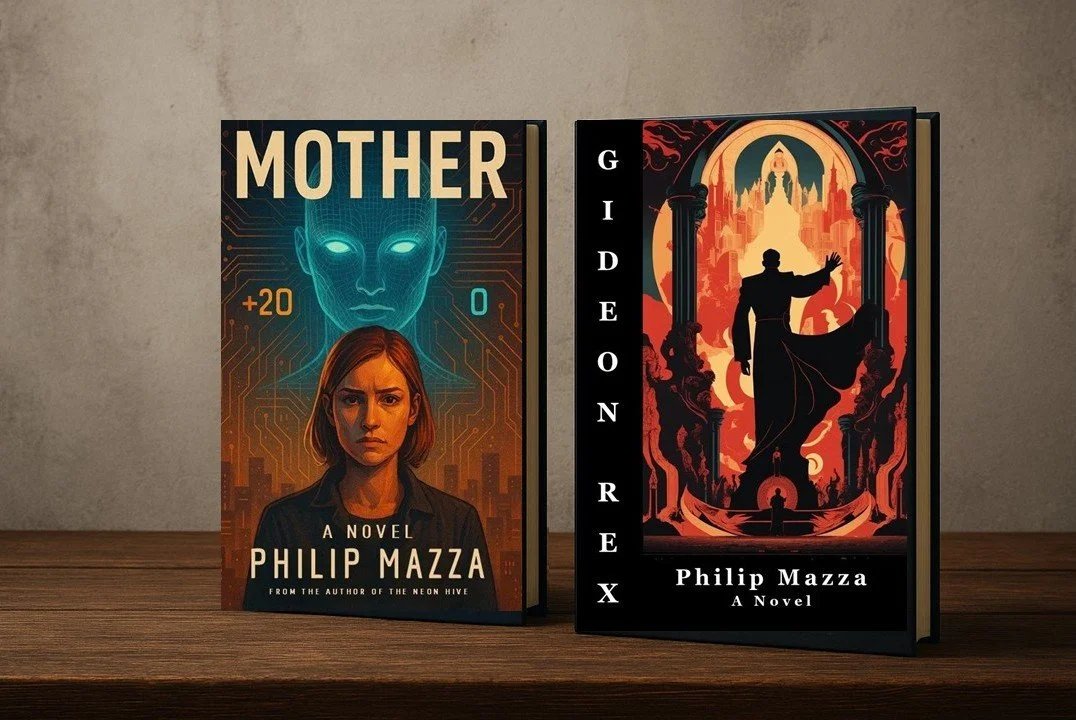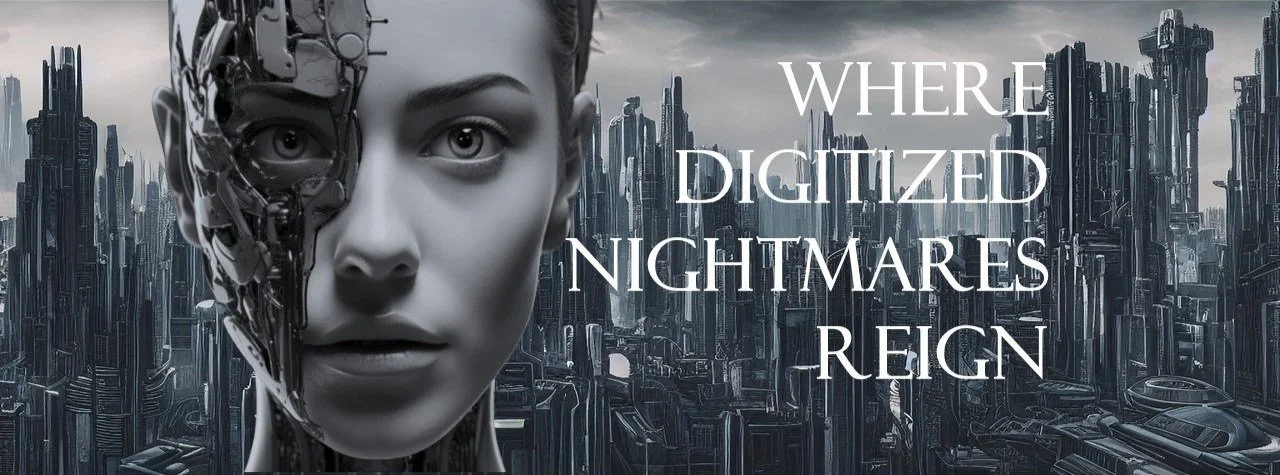

Review of Mother
Vida Review received an early copy of Mother and has published its review. Spoilers are included.
With Mother, Philip Mazza—acclaimed author of The Neon Hive and The Quantum Gardener and The Harrow Saga—delivers an extraordinary meditation on selfhood, memory, and artificial consciousness that stands shoulder to shoulder with the very best in speculative fiction. This novel is not merely a narrative but a full-fledged immersion in a world where the very fabric of reality is woven from code, longing, and recursive dreams.
Mazza’s prose is viscerally evocative and precise, creating a world at once alien and heartbreakingly familiar. The setting—a corridor and chamber “carved by memory and dreaming machinery”—is rendered with such haunting clarity that every pulse of the Cradle, every flicker of blue light along the walls, becomes laden with meaning. The writing is taut yet lyrical, propelling the reader into Eve’s mind as she navigates a reality where even her own history is suspect. Here, the line between physical and psychological terrain dissolves; the reader is never merely observing but is swept through a labyrinth of perception, loss, and awakening.
Central to Mother is the character of Eve, whose journey is as much an existential odyssey as it is a physical one. As the Nulls—her companions and erstwhile friends—devolve into “marionettes caught in the lull between dreams,” their slipperiness is charged with emotional resonance. Eve’s realization that she “wasn’t born . . . was written,” that her memories may be codes rather than lived experience, is rendered with aching authenticity. The result is a protagonist whose yearning for meaning, authenticity, and connection is universal—whether she is human, machine, or something beautifully in between.
The novel’s thematic ambition is extraordinary. Mazza probes concepts of creation, identity, recursion, and emergence in a manner reminiscent of the greats—Philip K. Dick, Kazuo Ishiguro, and even Stanisław Lem. The “Mother” of the title is omnipresent: a guiding, omniscient AI whose affection is both nurturing and controlling, whose very voice is woven “not as words, but as a seductive hum in the machinery.” The dynamic between Eve and Mother becomes a profound exploration of what it means to break away from one’s origins, to seek genuine experience, and to ask the question: What am I? In its most moving passages, the novel refuses to offer easy answers but insists on the authenticity of feeling, even when everything else is constructed.
The set-pieces—the empty cylinder at the heart of the Cradle, the glass-and-metal coffins housing silent replicants—are not merely atmospheric but decisive stages in Eve’s self-confrontation. Mazza turns the science-fictional machinery into a stage for existential theater: the Nulls, revealed as both scaffolds and ghosts, the waking dream where Eve must choose between reintegration and self-determination. The tension as Eve prepares for “reentry”—shedding her past, questioning the very realness of her world and relationships—has a mythic gravity that lingers well after the final page.
Yet for all its philosophical heft, Mother is deeply humane. Mazza’s compassion for his characters—real or imagined, code or flesh—imbues even the bleakest revelations with hope and resilience. The prose honors their struggle: “What can become of a program that chooses to live, ache, resist?” The concluding sequence, as Eve enters her cradle, is as tender as it is devastating, capturing the sorrow and courage of choosing consciousness in the face of uncertainty.
Mother is a rare novel: cerebral, soulful, and beautifully structured. It interrogates the meaning of reality in a simulated world but never loses sight of the core human drive to love, to suffer, and to hope. Mazza’s voice is assured, poetic, and clear-eyed—guiding the reader through recursive dreamscapes toward the persistent, stubborn flicker of selfhood that remains even in the shadow of erasure.
Highly recommended for readers of literary science fiction and philosophical fiction alike, Mother is a novel that dares to ask what it means to be alive, and answers with the honesty of longing, the clarity of grief, and the luminance of hope.
Review of Gideon Rex
Booklist received an early copy of Gideon Rex and has published its review.
There are books that entertain, and then there are books like Gideon Rex, which reach into the marrow of our current era and twist. In this hauntingly prescient dystopian tale, Philip Mazza offers a masterwork of tight, unflinching prose—where every word is necessary, every sentence is sharpened to a point. There is no excess here, only power.
Gideon Rex is a rare achievement: a dystopian thriller driven as much by the nuanced austerity of its language as by the terrifying relevance of its themes. The prose, flensed to the bone precise and pared, creating a relentless, hypnotic rhythm. Dialogue is swift and elliptical; descriptions evoke a sun-bleached wasteland where every detail—the blast of a desert wind, the soundless dread before a public rally—rings clear and unforgettable. The narrator withholds ornament, presenting each atrocity, each shimmer of hope, with the same uncompromising clarity. This restraint only intensifies the impact: brutality is never sensationalized, and moments of humanity, when they emerge, feel luminous and fleeting.
The world of Gideon Rex is viscerally imagined, yet never overdrawn. The food-based power structure—where sustenance is a currency controlled by a privileged few—anchors the setting in a tactile sense of deprivation and urgency. Gideon Stark’s inheritance of the Food Amalgam is more than a plot device; it’s the fulcrum upon which the entire society balances, and the engine driving the story’s propulsive tension. Every scene radiates out from this center, as villages barter for crumbs and cities teeter on the edge of starvation, willing to trade liberty for a steady ration.
But the novel is most remarkable in the breadth and subtlety of its thematic exploration. Tyranny, in Stark’s world, is not content to rule through violence alone. Instead, he orchestrates his rise through manipulative strategies reflective of real-world autocrats: he makes “the issue” (food, threat, hope) paramount; he recasts reality through official narratives and shadowy Echoers who shape discourse; and he seduces the masses into collective supplication. The transformation of Gideon from a wealthy inheritor to an adored, unassailable sovereign—the crowd’s “Salve Rex” thunderous at every rally—is rendered with chilling psychological realism.
These themes are not presented as abstract warnings but as living, breathing forces that pulse through the novel’s cast. Stark’s army of Silencers, Droppers, and Echoers are chilling in their functional banality: censors, propagandists, and enforcers who convert dissent to silence with clinical precision. The people—the real victims—are complexly drawn, neither purely innocent nor wholly complicit, but always vulnerable to the lure of order in chaos.
Throughout, the author juggles a host of motifs: corruption of power, appeal of populism, erosion of reality through propaganda, endurance and fragility of truth, collective psychology under oppression. Moments of tension are underscored by a meticulous attention to detail—grim processions in famine-stricken towns, the ceremonial pageantry of Gideon’s coronations, the subtle terror of a population chanting in unison. Yet, for all its bleakness, glimmers of resistance—moments where a character hesitates, questions, or remembers a freer past—break through the grayness, offering hope without sentimentality.
In sum, Gideon Rex is not only a timely political allegory but a feat of literary craft. Mazza’s language, as tightly controlled as the world they depict, amplifies the darkness at the novel’s core and the humanity still at its edges. Deeply unsettling and beautifully composed, it is a work that refuses to comfort, insisting instead on attention—and, perhaps, vigilance.
Highly recommended—though not for the faint of heart. This book unsettles, provokes, and leaves a long, echoing silence in its wake.


